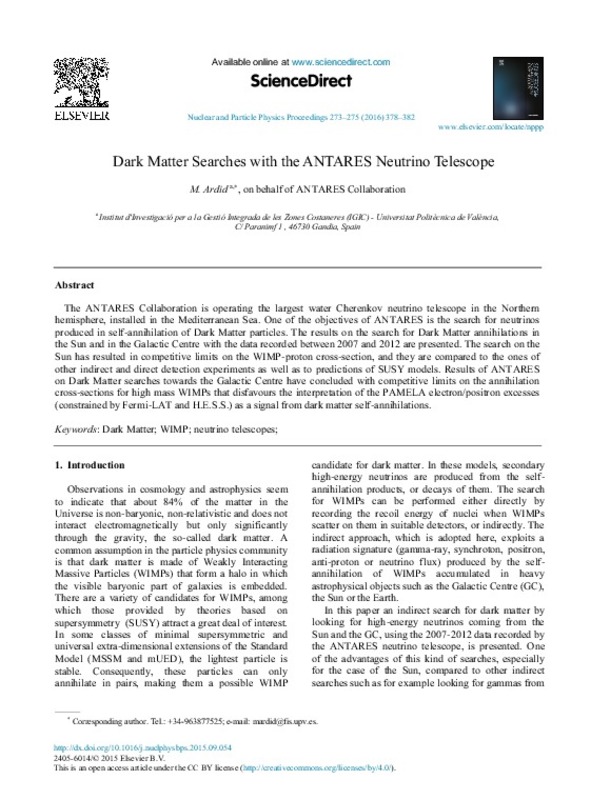JavaScript is disabled for your browser. Some features of this site may not work without it.
Buscar en RiuNet
Listar
Mi cuenta
Estadísticas
Ayuda RiuNet
Admin. UPV
Dark Matter Searches with the ANTARES Neutrino Telescope
Mostrar el registro sencillo del ítem
Ficheros en el ítem
| dc.contributor.author | Ardid Ramírez, Miguel
|
es_ES |
| dc.date.accessioned | 2018-05-24T04:20:32Z | |
| dc.date.available | 2018-05-24T04:20:32Z | |
| dc.date.issued | 2016 | es_ES |
| dc.identifier.issn | 2405-6014 | es_ES |
| dc.identifier.uri | http://hdl.handle.net/10251/102490 | |
| dc.description.abstract | [EN] The MOSCAB experiment (Materia OSCura A Bolle) uses the Geyser technique for dark matter search. The results of the first 0.5 kg mass prototype detector using superheated C3F8 liquid were very encouraging, achieving a 5 keV nuclear recoil threshold with high insensitivity to gamma radiation. Additionally, the technique seems to be easily scalable to higher masses for both in terms of complexity and costs, resulting in a very competitive technique for direct dark matter search, especially for the spin dependent case. Here, we report as well in the construction and commissioning of the big detector of 40 kg at the Milano-Bicocca University. The detector, the calibration tests and the evaluation of the background will be presented. Once demonstrated the functionality of the detector, it will be operated at the Gran Sasso National Laboratory in 2015. | es_ES |
| dc.description.sponsorship | We acknowledge the financial support of the Spanish Ministerio de Ciencia e Innovación (MICINN) and Ministerio de Economía y Competitividad (MINECO), Grants FPA2012-37528-C02-02, and Consolider MultiDark CSD2009-00064, and of the Generalitat Valenciana, Grants ACOMP/2014/153 and PrometeoII/2014/079. | es_ES |
| dc.language | Inglés | es_ES |
| dc.publisher | Elsevier | es_ES |
| dc.relation.ispartof | Nuclear and Particle Physics Proceedings | es_ES |
| dc.rights | Reconocimiento (by) | es_ES |
| dc.subject | Geyser detector | es_ES |
| dc.subject | Dark Matter | es_ES |
| dc.subject | Bubble Chamber | es_ES |
| dc.subject | WIMP | es_ES |
| dc.subject | neutrino telescopes | es_ES |
| dc.subject.classification | FISICA APLICADA | es_ES |
| dc.title | Dark Matter Searches with the ANTARES Neutrino Telescope | es_ES |
| dc.type | Artículo | es_ES |
| dc.identifier.doi | 10.1016/j.nuclphysbps.2015.09.054 | es_ES |
| dc.relation.projectID | info:eu-repo/grantAgreement/MINECO//FPA2012-37528-C02-02/ES/PARTICIPACION DEL IGIC EN ANTARES Y KM3NET/ | es_ES |
| dc.relation.projectID | info:eu-repo/grantAgreement/GVA//ACOMP%2F2014%2F153/ | es_ES |
| dc.relation.projectID | info:eu-repo/grantAgreement/MICINN//CSD2009-00064/ES/Método de Multimensajeros para la Detección de la Materia Oscura/ | es_ES |
| dc.relation.projectID | info:eu-repo/grantAgreement/GVA//PROMETEOII%2F2014%2F079/ES/Telescopios de Neutrinos en el Mediterráneo/ | es_ES |
| dc.relation.projectID | info:eu-repo/grantAgreement/Generalitat Valenciana//ACOMP%2F2014%2F153/ES/AYUDA COMPLEMENTARIA DEL PROYECTO: PARTICIPACION DEL IGIC EN ANTARES Y KM3NET/ | es_ES |
| dc.relation.projectID | info:eu-repo/grantAgreement/Generalitat Valenciana//PROMETEOII%2F2014%2F079/ES/Telescopios de Neutrinos en el Mediterráneo/ | es_ES |
| dc.rights.accessRights | Abierto | es_ES |
| dc.contributor.affiliation | Universitat Politècnica de València. Departamento de Física Aplicada - Departament de Física Aplicada | es_ES |
| dc.description.bibliographicCitation | Ardid Ramírez, M. (2016). Dark Matter Searches with the ANTARES Neutrino Telescope. Nuclear and Particle Physics Proceedings. 273:378-382. https://doi.org/10.1016/j.nuclphysbps.2015.09.054 | es_ES |
| dc.description.accrualMethod | S | es_ES |
| dc.relation.publisherversion | http://dx.doi.org/10.1016/j.nuclphysbps.2015.09.054 | es_ES |
| dc.description.upvformatpinicio | 378 | es_ES |
| dc.description.upvformatpfin | 382 | es_ES |
| dc.type.version | info:eu-repo/semantics/publishedVersion | es_ES |
| dc.description.volume | 273 | es_ES |
| dc.relation.pasarela | S\329056 | es_ES |
| dc.contributor.funder | Generalitat Valenciana | es_ES |
| dc.contributor.funder | Ministerio de Economía y Competitividad | es_ES |
| dc.contributor.funder | Ministerio de Ciencia e Innovación |








